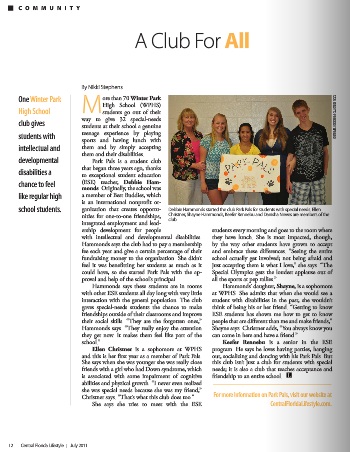By Nikki Stephens
With the University of Central Florida College of Medicine completing its first year and with plans for a Valencia campus, as well as a UCF new dental school in the planning stages, many of the initial large-scale education components of the Medical City are coming together nicely.
The UCF College of Medicine was established in 2006 by the Florida Board of Governors, the Florida Legislature and the Governor of Florida in order to increase opportunities for medical education in Florida, address the physician shortage and enhance the overall economy. According to the school’s website, www.med.ucf.edu, the College of Medicine is a forward-looking medical school with a culture based on partnership and collaboration and is an integral part of the growing medical city in Lake Nona.
In August 2010, the M.D. program enrolled its second class of 60 students, and for the second year in a row, the college received more applications than any other public medical school in Florida.
The UCF Medical school is also doing its part in building up the economy, even surpassing projected numbers. In 2006, the Milken Institute conducted a study to determine a 10-year economic-activity projection based on the addition of the school. In only two years of running, the school has reached 80 percent of that projection already.
A 2008 economic impact study says that by 2017 up to 30,000 new jobs could be added. UCF is also addressing the physician shortage around the country right now by producing up to 120 medical graduates a year.
Down the road, Valencia College broke ground on the first building of its new Lake Nona Campus on June 22. The Valencia campus will open opportunities for students to study biomedical and life sciences and to earn their associate degrees.
Dr. Mike Bosley, assistant provost at Valencia College Lake Nona, says the three-story, 83,000 square-foot building will open in August 2012. It will have 18 classrooms, six science labs, a library, a bookstore, small café and administrative offices. It cost roughly $21.7 million and is the first of four buildings proposed for the campus. All four buildings will eventually accommodate about 5,000 students and 250,000 square feet.
There is also hope for a UCF dental school in the area. Zenaida Gonzalez Kotala, senior communications coordinator for UCF News & Information, says UCF’s proposed College of Dental Medicine will be an economic driver for Central Florida, will strengthen the UCF Health Sciences Campus at Lake Nona and will bring an increased focus to the emerging medical city.
The idea of a new dental school in the area is undergoing a lot of criticism though, which stems from state reports that say there are plenty of dentists in Florida, just not in the areas with the greatest need.
Kotala says the Florida Board of Governors is currently considering whether it is wise to invest in creating these costly dental schools when the schools won’t necessarily address the big picture problem. UCF responds to this debate by not seeking any state funds for the dental college. “We have a $10 million donation, will secure loans and are creating a funding model that requires no state funds,” she says. “The school will use tuition and fees as well as clinic income to be self-sufficient.”
The College of Dental Medicine is expected to create at least 110 local jobs as well as an initial economic impact of $73 million.
If the Board of Governors approves the building of a dental school, Kotala says the plan is to construct one building next to the UCF College of Medicine and have the school’s first 60 students start classes in 2014.
